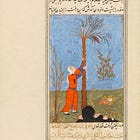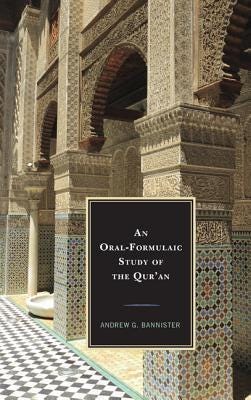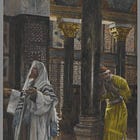1. Not so Arabic? 275 non-Arabic words
2. Inconsistent frequency of the use of the word Allah between earlier and later surahs indicating possible development within the text- Allah is not mentioned in over 30 of the earliest surahs but is mentioned nearly every second verse in 67 of the latest surahs
3. Formulaic density- statistical evidence of oral sayings borrowing from other sources incorporated in the Qur’an
Find us on Medium.com
Or Twitter
https://twitter.com/StreetTheologn
Or our brand new Insta:
instagram.com/streettheologianapologetics/
Is the Qur’an Allah’s eternal, uncreated word, in pure Arabic or does it contain some non-Arabic words, signs of development within the text and evidence that it incorporates oral traditions that made use of legends and narratives that were popular at the time of its composition?
For a more detailed review read here:
1. Not so Arabic? 275 Non-Arabic Words
The Qur'an is written in pure Arabic according to Surah 12:2, 13:37, 16:103 and 41:41-44.
Surah 13:37 expresses:
And thus We have revealed it as an Arabic legislation. And if you should follow their inclinations after what has come to you of knowledge, you would not have against Allāh any ally or any protector.
However, it contains numerous foreign words in Egyptian, Acadian, Assyrian, Aramaic, Persian, Syriac, Hebrew, Greek, and Ethiopian.
Jalal-ud-din Al-Suyuti, (c. 1445-1505 AD) in his book Itqan fi Ulum al- Qur'an “Perfection in the Qur'anic Sciences” chapter 38 lists 275 non-Arabic words in the Qur'an.
2. Development within the text? Inconsistent frequency of the use of the word Allah between earlier and later surahs- Allah is not mentioned in over 30 of the earliest surahs but is mentioned nearly every second verse in 67 of the latest surahs
This indicates possible development and raises the question whether the Qur'an is based on an eternal unchanging source. Particularly given many of the earliest surahs do not even mention Allah while the latest surahs refer to Allah every second verse or more!
For a chronological ordering of surahs (there are some slightly varying views) in the Qur'an refer to this link from the Tanzil site.
How often different surahs use the name “Allah”
Islamic studies lecturer, Dr. Bernie Power, provides the following information on this point (Note: he is referring to chronologically ordered surahs not surahs as ordered in the Qur'an. Also note this does not include the introductory comment about Allah at the start of each surah):
Thirty-four of the earliest surahs (i.e. 30% of the 114 chapters which make up 15% of the Qur’an’s verses) never use ‘Allah’ as the name of God.
Six surahs 101, 102, 103, 107, 109 & 111 do not mention any deity at all.
Three surahs in 80, 86, and 90 allude to an unnamed deity but do not give any name for Him. The divine self-descriptor ‘We’ occurs sometimes.
In 25 surahs, (surahs 43; 54; 55; (note: 7 of the 10 chronological lists put this as Meccan); 56; 68; 73 (v.20 was a Medinan addition); 74; 75; 77; 78; 79; 82; 83; 89; 92; 93; 94; 97; 99; (note: 5 of the 10 chronological lists put this as Meccan); 100; 105; 106; 108; 113; 114) ‘Lord’ rabb or ‘the Merciful’ al-Raḥmān (Surah 43 and 78) are the only names used for the deity.
The earliest revelation to Muhammad doesn’t mention Allah?
The earliest surahs are invariably the Meccan surahs. 96:1-5 is generally seen as the earliest revelation to Muhammad, and it does not mention ‘Allah’.
Note that Sura 96, the earliest chapter in the Qur’an, has two parts. vv.1-5 are seen as the first verses revealed to Muhammad in the cave on Mt Hira in 610 AD. However vv.6-19 come at a later stage after Muhammad had been taught to pray (v.10), and began public preaching (v.12) before being opposed by ‘Abu Jahl’ Amr bin Hisham (vv.13-19). This would have been after the ‘intermission’ or fatrah, the period of public silence before Muhammad began preaching openly, possibly as late as 613 AD.
Among the thirteen other earliest Meccan chapters, ‘Allah’ is named only once each in eleven surahs (112, 104, 96, 95, 92, 88, 87, 84, 70, 69 & 67), twice in one (85), four times in another (71).
So 47 of the earliest surahs (with nearly 1200 verses) contain the word ‘Allah’ a total of 17 times.
The name Allah becomes more frequent
As the Qur’an progresses, the name ‘Allah’ becomes more frequent: the later surahs name ‘Allah’ on average once every two verses (2652 times in 5067 verses).
There appears to be some uncertainty about a suitable nomenclature for the Deity in the chronologically earliest surahs of the Qur’an. Initially “Lord” rabb or “We” or “the Merciful” al-raḥmān were used. It may be significant that the full first sentence of the shaḥāda or confession of faith la ilāh illa allāh (‘There is no god except Allah’) is found only twice in the Qur’an (37:35; 47:19) and in the later chapters, whereas the non-Allah version “There is no god except Him” la ilāh illa huwa occurs twenty-nine times (eg. 73:9) always in the earlier chapters.
In the later surahs, however, Allah becomes the most common name for the Deity, and it is used frequently.
This trend can be represented in a chronological diagram.
This uncertainty is hinted at in 17:110 where the readers are told: ‘Invoke Allah or invoke al-rahmaan, whatever (name) you invoke…
Conclusion
Thus, there is substantial evidence of development or change in the way Allah is referred to in the Qur'an.
More of Dr. Power’s work can be found here.
Using resources from, QuranicAnalysis.com (searching for الله) and Tanzil.net, I put together the following charts on the word use of Allah in the Qur'an ordered by chronological Surah.
Detailed chart:
High level chart
3. Andy Bannister’s Ground-breaking Evidence – High Formulaic Density in the Qur’an indicating oral communication that incorporated previously known stories
In An Oral-Formulaic Study of the Qur'an, Islamic scholar Andy Bannister analyses the formulaic density in the Qur'an. Bannister identifies “an overall formulaic density for the entire text of between 23.55 % and 52.18 % depending upon the parameters configured for the computer analysis tool (p.163)”.
Formulaic density refers to the concentration or frequency of formulaic expressions within an oral or written text.
A density of over 20% indicates formulaic borrowing, where a speaker incorporates existing legends, stories, or narratives into oral communication.
99 surahs have a density of 20% or higher, 69 of 40% or higher, 45 of 50% or higher and 14 have a density of 60% or higher. One (Surah 61) has a density of 77% or more.

This demonstrates the Qur'an is most likely based on oral performance responses that often incorporate commonly known narratives, fables, or legends.
Bannister’s work casts significant doubt on the commonly held Muslim belief that the Qur'an is Allah’s eternal word, for the evidence points to the Qur'an being founded on oral communication that frequently incorporated stories circulating at the time of composition.
















